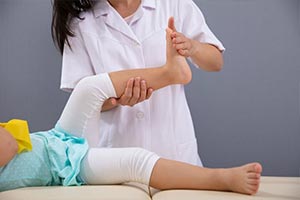 Pediatric physiotherapy, also known as pediatric physical therapy, is a specialized branch of physiotherapy that focuses on the assessment, treatment, and rehabilitation of infants, children, and adolescents. The goal of pediatric physiotherapy is to promote optimal physical development, improve movement skills, address musculoskeletal issues, and enhance overall functional abilities in young individuals. This area of physiotherapy is diverse, covering a range of conditions, from developmental delays to congenital disorders and injuries.
Pediatric physiotherapy, also known as pediatric physical therapy, is a specialized branch of physiotherapy that focuses on the assessment, treatment, and rehabilitation of infants, children, and adolescents. The goal of pediatric physiotherapy is to promote optimal physical development, improve movement skills, address musculoskeletal issues, and enhance overall functional abilities in young individuals. This area of physiotherapy is diverse, covering a range of conditions, from developmental delays to congenital disorders and injuries.
Benefits of pediatric physiotherapy:
- Early Intervention for Developmental Delays: Pediatric physiotherapy provides early identification and intervention for developmental delays, optimizing a child’s potential for motor and functional development.
- Improved Motor Skills: Targeted interventions help enhance gross motor skills (such as crawling, walking, and running) and fine motor skills (such as grasping objects and hand-eye coordination).
- Enhanced Muscular Strength and Endurance: Exercise programs are designed to improve muscle strength, endurance, and overall physical conditioning in children with various conditions.
- Optimized Gait and Walking Patterns: Physiotherapy addresses gait abnormalities and walking difficulties, promoting improved walking patterns and stability.
- Orthopedic Condition Management: Physiotherapy interventions assist in the management of orthopedic conditions, such as congenital limb abnormalities, scoliosis, and fractures, contributing to improved mobility and function.
- Neurological Rehabilitation: Children with neurological conditions, such as cerebral palsy or spina bifida, benefit from physiotherapy to improve motor function, coordination, and independence.
- Improved Respiratory Function: Physiotherapy interventions include exercises to enhance lung function and breathing patterns in children with respiratory conditions.
- Enhanced Coordination and Balance: Interventions focus on improving coordination, balance, and control, contributing to better overall physical function.
- Pain Management: Strategies are employed to manage pain associated with musculoskeletal or neurological conditions, improving overall comfort and well-being.
- Sensory Integration: Physiotherapy addresses sensory processing issues, supporting children in better interpreting and responding to sensory stimuli.
- Developmental Coordination Disorder (DCD) Management: Children with DCD benefit from physiotherapy interventions to improve motor planning, coordination, and performance in daily activities.
- Post-Surgery Rehabilitation: Physiotherapy assists in the recovery process after orthopedic or neurosurgical procedures, optimizing function and promoting a quicker return to daily activities.
- Cerebral Palsy Management: Tailored programs support the unique needs of children with cerebral palsy, addressing mobility, strength, and functional independence.
- Promotion of Independence: Physiotherapy helps children develop the physical skills necessary for independence in daily activities, fostering confidence and autonomy.
- Assistive Devices and Adaptive Equipment: Physiotherapists recommend and teach the use of assistive devices or adaptive equipment, enhancing a child’s ability to engage in daily tasks.
- Parent and Caregiver Education: Education on techniques, exercises, and strategies empowers parents and caregivers to actively support their child’s development and ongoing rehabilitation.
- Improved Quality of Life: Overall, pediatric physiotherapy contributes to an improved quality of life for children by addressing physical challenges and promoting an active and healthy lifestyle.
